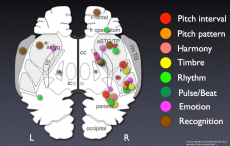
I would still maintain, that even those suffering from mood disorders may at least experience some form of catharsis as a result of listening to ‘sad’ music that is more reflective of their mood, rather than counteractive. Purging of negative emotions through music is an arguably healthy form of release.
Conclusion
In conclusion, I would say that there is a vast and ever-increasing body of evidence to support the use of music in a medicinal setting. Certainly, I agree that more research is required, and would drastically benefit how we know how to ‘use’ music for the most benefit, in both neurological and psychological contexts; in fact, I would urge those in charge of health and social care sectors to fund this area on the basis of the glaring amount of therapeutic potential that music has for all demographics of people within society, and for multiple health issues. Equally, due to no negative side-effects, it is a much safer pathway of treatment to explore.
‘It is a sad reflection that Western society has evolved in a manner that permits vulnerable individuals to remain on the margins of society,’ (Bailey and Davidson, 2005); this sentiment is echoed through the devastating explosion of homelessness, mental illness, neurodegenerative disease and poverty. As such, I believe it is vital that we begin to take advantage of a treatment that our brains have readily evolved to process; music. Multiple studies have demonstrated music’s abilities to heal; music can ‘improve movement in neurologically impaired patients with stroke or Parkinson’s disease,’ (Sleight, 2016) and there is more than sufficient evidence to show how music can impact upon the brain to the extent wherein it moves its very ‘operations’ to other parts of the brain, so as to maintain functions; ‘there has nonetheless been a significant reconstruction of function, so that much of what seemed irretrievably lost is now available to him again,’ (Sacks, 2007). With these increasing discoveries of the potential of our brain in conjunction with music, such as that or neuroplasticity, with the brain reshaping itself in a very literal sense, we have every reason to use this to our advantage. The brain has evolved this amazing capability, with something that
we initially thought was ‘nonadaptive pleasure seeking’ (Huron, 2003) to effectively rewire itself, through a deep-seated evolutionary adaptation that has inextricably linked pleasure and neurobiological preservation, thus prompting us to use this adaptation to its full potential.
The idiosyncratic nature of music makes it a prime candidate for treatment prospects, as we are now beginning to comprehend the need for tailored therapies for all diseases. Specific songs have the power to trigger what were thought to be lost memories, or motor functions, or to immensely increase psychological wellbeing through elevated levels of dopamine, and improved synaptic transmissions. Therefore, this tool could be just what we need to help us to fight against the failing social care system and the subsequent effects upon our most vital asset; our brains.
Undoubtedly, we face new challenges as a threat to our ‘survival;’ now we come up against an increasing and ageing population, with degenerating neurological and psychological health. But with the new threats to our species, comes our brains’ imminent mutation; the ability to change, mould to a new, more adaptive fit. And all with the help of our most prominent aspect of our culture, that society itself stands upon; music.
As we push forward in our endeavours to further our advancement as a society, and indeed a species, I would strongly argue that there is more than sufficient evidence to illustrate the therapeutic qualities of music, and therefore, we would be foolish not to explore this further, for the benefit of the individual, and society as a whole.
No matter what happens to the brain, it interprets music to ‘fix’ and reshape itself. We need to work with the body, with the naturally selected adaptations, in order to preserve our health, and ensure our future as the human race.

0 Comment:
Be the first one to comment on this article.